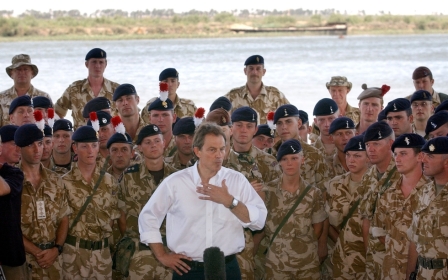UN blames Iraq Shia militia for abductions and beheadings in Fallujah

A Shia militia that fought alongside Iraqi forces against the Islamic State group (IS) in Fallujah may have kidnapped 900 civilians and executed at least 50, some by beheadings and torture, the UN said on Tuesday.
The initial phase of Iraq's vast offensive to retake the city from IS was supported by several Shia militia, which raised fears of reprisals against the area's Sunni Muslim population.
UN rights chief Zeid Ra’ad al-Hussein said there was strong evidence that one group, Kataeb Hezbollah, perpetrated atrocities after telling civilians that they were there to help.
"This appears to be the worst – but far from the first – such incident involving unofficial militias fighting alongside government forces," the UN High Commissioner for Human Rights said in statement.
He warned that with Iraq preparing another offensive against IS in their northern bastion Mosul, more Sunni civilians could face horrific violence as retribution for the crimes of IS, a Sunni militant group.
900 missing or killed
Kataeb Hezbollah fighters approached the village of Saqlawiyah near Fallujah, 50km west of Baghdad, on 1 June, Zeid's office said in a statement, citing evidence of witnesses.
Villagers spotted the fighters as they were leaving Saqlawiyah amid the assault on IS.
The militia members "hailed them with loudspeakers, saying the villagers had nothing to fear from them," according to the rights office.
"Witnesses said that hidden behind the Iraqi flags they saw the flags of a militia called Kataeb Hezbollah," the UN statement added.
Women and children were sent to a displaced persons camp while men and teenage boys were taken to a series of locations.
According to witnesses, those who asked for water "were dragged outside and shot, strangled, or severely beaten," the UN said.
The abducted males were separated on 5 June, and 605 men and boys taken to a refugee camp.
The whereabouts of a second group, with an estimated 900 people, was "unknown", according to Zeid.
The rights chief said locals made a list of 643 missing men and boys and "49 others believed to have been summarily executed or tortured to death while in the initial custody of Kataeb Hezbollah."
Locals said an additional 200 people have not been accounted for.
Women in the refugee camp at Amriyat al-Fallujah told AFP last month that their sons, husbands and nephews were missing.
Zeid spokesman Rupert Colville said Iraq's government had launched an investigation but had no details on its progress.
"People who escape from (IS) should be treated with sympathy and respect, not tortured and killed simply on the basis of their gender and where they had the misfortune to be living when (IS) arrived," Zeid said in the statement.
One Fallujah resident told Associated Press that he believed there was no will on the part of the government to engage with Sunnis in Fallujah.
The government in Baghdad "believes that Fallujah is the centre of terrorism in Iraq," said Sheikh Hadi Muhamed Abdullah.
"But for us it's the centre of resistance. The resistance started as pure, but others like Daesh [IS] corrupted it."
This article is available in French on Middle East Eye French edition.
Stay informed with MEE's newsletters
Sign up to get the latest alerts, insights and analysis, starting with Turkey Unpacked
Middle East Eye delivers independent and unrivalled coverage and analysis of the Middle East, North Africa and beyond. To learn more about republishing this content and the associated fees, please fill out this form. More about MEE can be found here.




